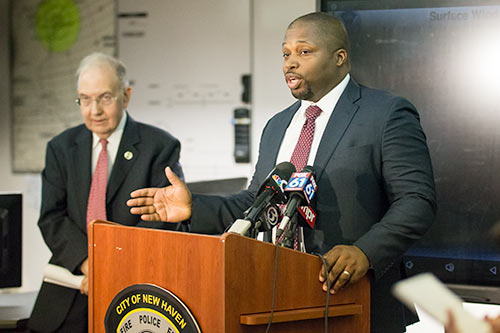Senate Democrats: Let Hurricane Florence Serve as Reminder: Now is the Time to Prepare for a Major Storm

NEW HAVEN, CT—With Hurricane Florence set to slam into the East Coast within hours, Senate Democrats joined today with first responders in the New Haven Emergency Operations Center to warn Connecticut residents that now is the time to prepare for a major storm.
“While Connecticut is unlikely to be directly impacted, we do know that Connecticut has a long history of deadly and damaging hurricanes, most of which arrive between mid-August and late September,” said Senate President Pro Tempore Martin M. Looney (D-New Haven). “The time to prepare for a major weather event is now. Don’t wait until it’s too late. Of course, our thoughts are with the people who are in the storm’s path.”
“Every Connecticut resident should download the free ‘CT Prepare’ app on their smartphone,” said Senate Majority Leader Bob Duff (D-Norwalk). “This app provides vital information and alerts in emergency situations, and also helps you prepare in advance of an emergency.”
“If your family already has an emergency plan now’s a good time to remind everyone of that plan. If you don’t have a plan, it’s important to create one that includes preparing an emergency kit with essential items should you have to shelter in place or evacuate,” Senator Gary Winfield (D-New Haven) said. “Taking these basic steps now can help prevent a lot of hardship later on.”
“We don’t know what kind of storms will be hitting us over the next few months but having a plan for every scenario can help keep you safe,” Senator Tim Larson (D-East Hartford). “Being aware of what’s going on is critical so families should make sure they are signed up for their local emergency alert system and check the weather service regularly for updates.”
“I have every confidence in New Haven’s emergency management capacity—I believe the city’s first responders are the state’s very best,” Mayor Toni N. Harp said. “At the same time, city residents and business owners and operators are urged to take every precaution and have a well-rehearsed emergency response plan in place to ensure the best possible outcome under a worst-case scenario.”
“Because hurricanes are forecast in advance and we have time to prepare, all hurricane casualties are preventable. When the storm is bearing down, it is too late to prepare,” said Andy Horowitz, Assistant Professor of History at Tulane University, who is an expert on disasters and author of a forthcoming book from Harvard University Press on Hurricane Katrina. “The best way to face these challenges is together—with everyone doing their part—from federal and state government to you yourself checking on your neighbors to make sure they have plan.”
Get the Emergency Alert App for Your Smart Phone!
The ‘CT Prepares’ app can be downloaded for free from the iTunes Apple Store for Apple devices and Google Play for Android devices by searching the keyword “CT Prepares.” Once downloaded, “CT Prepares” will issue alerts for severe weather and other emergency situations.
The app incorporates and integrates text messaging, email, and social networking, allowing you to communicate with family members during an emergency. Real-Time notifications including emergency news, state office closings, and public safety messages can be sent directly to your device, providing up-to-the-minute information for residents.
CT Prepares allows users to:
- View real-time alerts
- View National Weather Service forecasts for you current location
- Access news and events from the Connecticut Emergency Management Agency
- Review preparation guides for different emergency situations
- Get in touch with a variety of emergency services
- Send an “I’m Safe” email message to your contacts via, text, email and social media
Hurricane Preparedness
Here’s what you can do to be prepared in the event of an approaching hurricane:
- Review your insurance policy.
- Learn locations of official shelters.
- Frequently listen to radio, TV or NOAA Weather Radio for official bulletins on the storm’s progress.
- Fuel and service your family vehicles.
- Ensure you have extra cash on hand.
- Buy food that will keep, and store drinking water.
- Prepare to cover all windows and doors with shutters or other shielding materials.
- Check batteries and stock up on first aid supplies and medications.
- Bring in lightweight, outdoor objects such as garbage cans, garden tools, toys and lawn furniture.
- Trim trees and shrubbery so branches don’t fly into your home.
- Clear clogged rain gutters and downspouts.
- Decide where to move your boat.
- Determine safe evacuation routes inland.
- Notify neighbors and a family member outside the area of your evacuation plans.
- Take pets with you if possible, but remember, most public shelters do not allow pets other than those used by people with disabilities.
For more information, download NOAA’s preparedness guide for tropical cyclones.
Additionally, the senators highlighted Connecticut’s anti-price-gouging laws which take effect once the governor has declared a state of emergency. When this happens, businesses are prohibited from increasing the price of a retail item or service in a location that is subject to a disaster emergency declaration.
Previously, the state’s price-gouging law only applied to gouging of goods. In 2013 Senate Democrats led passage of a new law expanding the scope of consumer protection laws to more effectively prohibit price gouging for services. Now, no one can sell or offer to sell any goods or services for an “unconscionably excessive price” during a weather emergency.
The determination of whether or not a price is unconscionably excessive is based on a number of factors, and explicit evidence of unconscionable pricing exists when there is a gross disparity between the price of goods or services during the weather emergency and their average price 30 days before the emergency began, or the sale price for goods and services grossly exceeds the sale price to consumers in the trade area.
Share this page:
